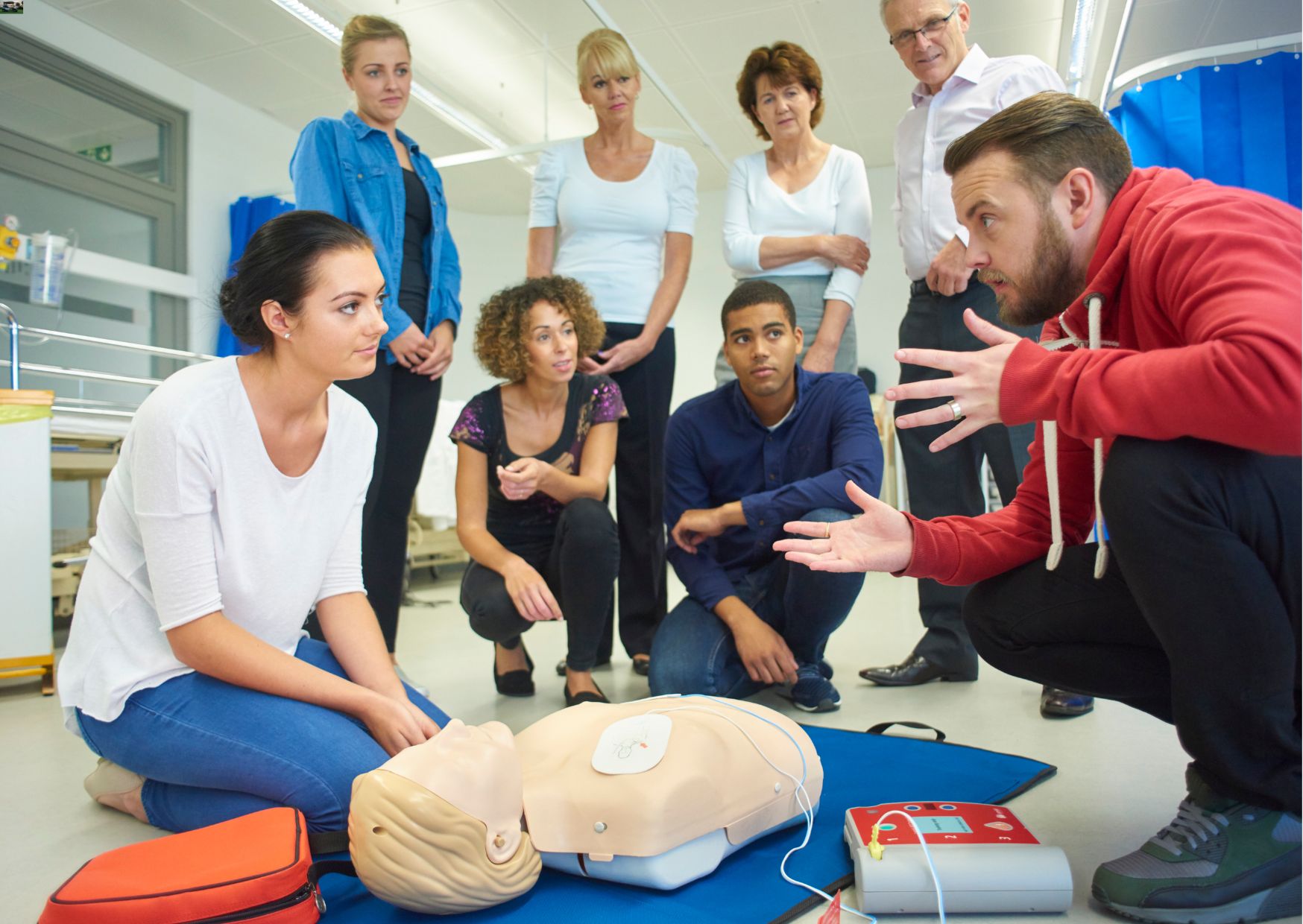To become an aid worker is an important and rewarding profession that provides humanitarian assistance to people in need. To become an aid worker, you help in a range of emergencies caused by natural disasters, war, and other crises. Their work ensures the reduction of suffering and enhancement of the quality of life for affected communities. It is instrumental in establishing global stability, peace, and development.
Role and Key Responsibilities of Different Types of Aid Workers
Emergency Relief Workers
Emergency relief workers respond to crises caused by natural disasters, conflict, or other emergencies that affect large numbers of people, providing food and water, shelter, or medical care on an urgent basis.
They evaluate affected communities’ needs, collaborate with local and international organisations, and ensure that aid gets to those who need it, and in a way that makes the biggest difference.
Similarly, humanitarian workers on the frontlines of an emergency are involved in risk reduction and preparedness activities to limit the impact of the next crisis.
Development Workers
Generally, development workers deal with long-term development projects to improve the socio-economic conditions of communities such as projects related to education, health care, infrastructure, provision of capital etc.
They work with them to pinpoint needs, plan and implement development efforts, and monitor and evaluate impact.
Development workers also lobby governments and other global powers for policy changes and build capacity to help locals promote their development.
Health Aid Workers
Health aid workers deliver medical aid and healthcare to those in need. They work with communities in crisis-ridden areas and in underdeveloped regions where access to care is limited.
They provide care and vaccinations, as well as offer health education and, crucially, work to address causes that might encourage the spread of disease. Health aid workers support improvements in local healthcare infrastructure and capacity.
They work with local health workers, both state and charitable, as well as international non-governmental organisations and national governments to provide healthcare services.
Education Aid Workers
Education aid workers aim to enhance access to education, improve the quality of learning and support those currently involved in teaching and learning in crisis-affected populations and those in developing areas.
They design and/or deliver programmes to provide education, train teachers, and produce learning materials and resources; biologists who work in centralised labs and who test and produce medicines; aid workers who make sure refugees receive the care and protection they need; engineer workers who manage repairs on infrastructure; and so forth. Other humanitarian professionals serve the most vulnerable within the population: teachers dedicated to providing education for marginalised and at-risk children, pastoralists and healthcare aides who treat the most vulnerable people, and social and educational professionals who identify and protect those in need of special care and protection.
They work with neighbourhood schools, communities and international organisations to make sure their farming systems are effective, environmentally friendly and enlightened.

What Does an Aid Worker Do?
Assessing Community Needs
To become an aid worker, you assess needs by learning about local communities or groups, before, during or following a crisis, or when they live in underdeveloped regions. They collect data, carry out surveys and interact with local stakeholders to do this. They use this information to identify priorities, plan interventions, and allocate resources effectively.
Planning and Implementing Aid Programs
They work with communities to determine what their needs are, and then formulate plans – for example, drawing up objectives, setting targets, and outlining schedules and budgets – about which ideas will be implemented as actual projects. They also work with local partners, international organisations and governments to make sure the programs are designed appropriately, and that they can be sustained after the experts have left.
Coordinating with Local and International Organizations
To achieve this, aid workers spend countless hours negotiating with a diverse range of other stakeholders, including local NGOs, state agencies and international organisations to match up supply with need, and use resources wisely. They also undertake coordination committees, information sharing as well as advocating on behalf of the communities they work with.
Distributing Aid Supplies and Resources
To become an aid worker, you monitor the distribution of food, water, shelter, medical supplies and educational materials, to ensure that they get to the right people and do not end up being misused. They also monitor the distribution process to prevent fraud, waste, and abuse.
Monitoring and Evaluating Program Effectiveness
To become an aid worker, you assess and measure these programmes so that they better understand whether an intervention is working and helping people. This is done by collecting data, field visits, and engaging with beneficiaries. They use it to tweak programmes, provide updates to stakeholders and learn from successes and failures.

Average Aid Worker Salary
Salary Ranges Based on Experience and Location
Salaries for aid workers can vary significantly depending upon their level of experience, the degree of humanitarian crisis at their place of work, and the type of organisation to which they are affiliated. Entry-level aid workers in the UK can earn between £20,000 and £30,000 a year. With a few years of experience gained, entry-level workers can progress to being mid-level aid workers, earning between £30,000 and £40,000 annually. With more than five years’ work experience, senior aid workers can command a salary of £40,000 to £60,000 a year, especially when in leadership or other specialised roles.
Those are the figures for entry-level aid workers in the US: $30,000-$40,000 a year; mid-level aid workers with two, three or four years of experience: $40,000-$60,000 a year; senior aid workers with more experience or working in specialised positions or leadership roles: $60,000-$80,000 or more a year.
Comparison of Salaries in Different Regions
Between regions, aid-worker salaries vary. However, in the UK, aid workers in London and the South East earn more than their urban and rural counterparts partly due to higher cost of living and skills shortage. To become an aid worker abroad, for instance, sometimes receive up to £5,000 to £10,000 more per year in London compared with other parts of the country.
This means that aid workers in the US are likely to make more in states like New York, California and Washington, which are significantly more expensive than, say, Texas or Florida. For example, in high-demand labour markets like New York City or San Francisco, the salaries of those workers with in-demand skills may be quite attractive.
Factors Influencing Aid Worker Salaries
Several factors can influence the salaries of aid workers. There are various reasons for different salaries. Here are some explanations.
- Experience: Experience affects salary. The aid workers get more money if they have higher experience, because of their highly skilled and explusive capability.
- Education and certifications: The higher the level of education or professional certification an aid worker has obtained, the better their earning power. To become an aid worker with relevant degrees such as international development, social work and so on, and those with certifications from reputable professional bodies, are more likely to earn better salaries.
- Location: Salaries are greatly varied by geographic location. To become an aid worker in urban or higher-cost-of-living areas generally receive higher salaries than those in more rural areas.
- Organisational type: Working for an international NGO or UN agency might pay better than working for a local NGO or smaller organisation.
- Demand intensity of Aid Workers: Demand for Aid workers largely depends on the extent of disaster/crisis or other constraints faced by individuals/agencies, resulting in higher costs for AW if the situation demands it. Demand intensity is based on areas where demand for Aid Workers is higher. This might be based on several points including the current crisis, humanitarian funding, cost effectiveness, human resource comparison etc.

Aid Worker Skills
Technical Skills
- Project Management: To become an aid worker, you must be able to project-manage aid programmes, by planning, implementing and monitoring them to achieve planned objectives, using efficient use of the available budget and working to a deadline for service delivery.
- Data analysis and reporting: To become an aid worker requires the ability to identify and measure community needs, communicate programme effectiveness, and make data-driven decisions. To become an aid worker, you need to be able to collect, analyse and interpret data.
- Knowledge of Relevant Laws and Regulations: To become an aid worker, you need to be strongly grounded in the laws and regulations that govern humanitarian work, including international humanitarian law, human rights law, and regulation.
Soft Skills
- Communication: To become an aid worker, strong communication skills are required to interact effectively with other beneficiaries, colleagues and stakeholders. The ability to explain things is crucial; aid workers have to be able to deliver a clear, precise message, as well as listen carefully and provide feedback.
- Cultural Sensitivity: To become an aid worker, you must be willing to learn and work in culturally diverse social settings. Being culturally sensitive and respectful and knowing how to build trust are values for working across cultural differences and supporting diverse community needs.
- Problem-Solving: Problems can be extremely complex and difficult to foresee in relief work. Well-developed problem-solving abilities allow for the generation of clear, achievable and practical solutions to issues that arise in the field.
- Resilience and Flexibility: To become an aid worker is challenging, physically and mentally, and can be extremely demanding. As such, it is imperative that prospective aid workers are flexible, resilient, and can cope with stress, as well as adapt to new and/or ever-changing places and working conditions.
Aid Worker Tips
Staying Updated with Global Humanitarian Issues
A new way of working Aid workers must also keep up with current issues in global humanitarian affairs. Maintaining an awareness of global issues, trends and best practices involved in humanitarian work is crucial to keep aid projects effective and up to date. Working in a fast-paced and innovative environment, humanitarian workers need to adapt and continually update their knowledge through reading humanitarian newsletters and magazines, listening to webinars, and taking part in other professional development programmes.
Professional Organisations
Joining a professional organisation – for example, the International Association of Professionals in Humanitarian Assistance and Protection (PHAP) or the Humanitarian Practice Network (HPN) – is one way to network, attend industry events and tap into relevant resources such as knowledge sharing, current information and research, and a community of peers who can support career development.
Certifications and Continuous Training
Certifications and additional training can both increase the capacity of an aid worker and showcase expertise, increasing the chance of promotion: Members with the Sphere Project certification and/or additional training in areas such as emergency response, project management, etc.
Experiential learning via internships and volunteering
Working as an intern (even without pay) or volunteering for relevant NGOs, governmental organisations or specialised aid agencies helps an aid worker gain practical experience in field conditions and the type of work performed. For instance, exposure to one humanitarian context or a single organisation may not be sufficient for an aid worker to fully comprehend the complexities of a context or gain relevant knowledge of the practices of another, leading to thoughtless or inappropriate responses.
Diverse contexts and/or organisations will offer varied experiences in terms of operating environments, industry approaches and challenges, as well as technical and programme interventions. This exposure, comparison and contrast will better equip humanitarians with matching responses, skill sets and practical approaches to problem-solving that are both effective and efficient, and draw on experiences of different aid organisations that have been there previously.

Aid Worker Requirements
Educational Requirements
- Diploma or Degree in International Development, Social Work or related field: Educational programs in international development, social work or a related field are highly beneficial for your organisational skills and general knowledge. With a diploma or degree, you will be equipped with the necessary competencies to better understand the complexities of the field and cater to the needs of communities.
- Related coursework: Project management, international relations, human rights and public health courses are especially relevant. They help to build the theoretical foundations and practical skills required for a successful aid career.
Certification Requirements
- Professional Certifications: A great way to advance in the international aid work field is by obtaining professional certifications. A certificate from the Sphere Project, Humanitarian Accountability Partnership (HAP) or any other body that has established itself as a go-to accreditation could mean the difference between standing out or being one of many. A certification process often entails the completion of required coursework and the passing of related exams.
Experience Requirements
- Internships and Volunteer Positions: Getting your hands dirty is critical. For the developing aid worker, internships and volunteer positions provide exactly that: hands-on experience with project execution, community engagement, crisis response, and in-country operations. For the aspiring aid worker, these are an invaluable opportunity to understand the minutiae of how the machinery of aid works and what daily life in the field entails – a necessary foundation for a career track.
How to Become an Aid Worker
Completing Relevant Education
- The First Step: Get a Diploma or a Degree To become an aid worker, the first step is to gain qualifications. Have you ever considered a diploma or degree in international development, social work or a related field? These give students the best training to work in this field because they teach humanitarian principles, project management and the art of community assessment.
- On-the-job training and specialised courses and workshops: While formal education is helpful, on-the-job training and specialised courses or workshops – for example, in aid work – can enhance your skills too. These provide training specific to the demands of the job, such as emergency response, public health or project management.

Gaining Practical Experience
- Internships and Volunteer Positions: Doing internships or volunteer work can be a great way to learn practical skills. Internships and volunteer work help in understanding the practicality that is taught theoretically in class and used in real life. In these roles, you can be an aid worker, intern or volunteer.
Obtaining Certification
- Professional Certifications in Humanitarian Aid: Get certified in humanitarian standards, humanitarian management and accountability for ethical reasons and to build up your skill set and resume. There are two prominent certifications: The Sphere Project Certification shows your commitment to humanitarian standards and principles, project management, and the way your organisation or project builds up its skills and sets up systems. The Humanitarian Accountability Partnership (HAP) certification is a quality assurance standard for NGOs that are accountable and responsible to the communities they serve.
Continuing Professional Development
- Workshops, Seminars, Webinars: Attend these regularly. These are events where a professional learns about the latest trends and best practices in the humanitarian sector; this is a continuing education (a necessity nowadays). You can network and meet interesting people and enhance your professional knowledge.
- Second degrees/Masters and specialisations: Going back to school for a Master’s in international development or specialising in areas such as public health or disaster management can offer jobs with increased responsibilities (and incomes) and add to your strategic and operational skills.
Networking
- Professional Organisations: becoming a member of a professional organisation will allow you to become part of the professional community – in support sectors such as logistics, shelter and WASH, some organisations facilitate exactly that, such as the International Association of Professionals in Humanitarian Assistance and Protection (PHAP), or the Humanitarian Practice Network (HPN) that support professionals in overcoming many of the barriers to collaboration mentioned earlier.
- Perform all necessary duties related to participating in humanitarian Events and Conferences: Mingling with humanitarian organisations; conferences, workshops and seminars give you an avenue to network with humanitarian professionals. Networking gives you friends, contacts, and advice from other professionals. You will also get job and employment opportunities in humanitarian organisations. This is a platform for you to share information and be informed about all the latest happenings in the world of humanitarian aid.
Frequently Asked Questions (FAQ)
1. Why should you become an Aid Worker?
Becoming an aid worker is one of the most dynamic careers available. You will be part of something worthwhile that is having a direct impact on the lives of crisis-affected people. Not only will you be at the forefront of humanitarianism, but you will also contribute to global sustainable development. The job carries enormous respect and is highly secure, paying good salaries and ensuring you have a job for life while making a worthwhile difference to people everywhere.
2. Is Aid Work a Good Career Choice for You?
Aid work is a great profession if you are a strong communicator, enjoy working in a cross-cultural environment, and have an interest in humanitarian principles. It appeals to people who are resilient, flexible and committed to humanitarian causes. You like problems – and, most of all, you thrive with challenges.
3. Aid Worker Salaries
Depending on the amount of experience a person has, where they’re based and what organisation they’re working for, salaries tend to start at between £20,000 and £30,000 a year in the UK and $30,000 to $40,000 in the US, and rise to between £30,000 to £40,000 per year in the UK and $40,000 to $60,000 in the US for mid-level aid workers, and £40,000 to £60,000 and more per year in the UK and often $60,000 to $80,000 or more in the US for senior aid workers with responsibility for specialist areas or in leadership positions.
4. Which Qualifications Can Help with a Career in Aid Work?
First of all, getting a diploma or degree in international development, social work or any other related area is helpful, as well as specific coursework in topics such as project management, international relations, human rights and public health. Having professional certifications such as the Sphere Project or the Humanitarian Accountability Partnership (HAP) can help you to qualify for certain jobs and further advance your career in this field.
5. Do I Need to Be an Experienced Aid Worker to Get Started?
No, you do not. Even those who are experienced aid workers usually start less so. Many entry-level roles – even some internships – have been opened up to people who are interested in giving it a try and learning on the job. There is a natural path through these sorts of roles and up into more senior roles. Getting a job as an aid worker intern or volunteer can be a good way for people to build up the skills they need to start a career.
6. Aid Worker Career Outlook
Job prospects for aid workers are great, and the demand for all types of humanitarian workers is very strong. The need is growing faster than the number of qualified applicants and the demand for aid is likely to remain high for the foreseeable future. The profession offers good job security, some flexibility, above-average salaries and attractive opportunities to move into senior or specialised positions. There is also a demand for technical expertise in implementing the new technological solutions that are being developed and a growing focus on careful analysis and the promotion of sustainable practices and development.
7. Aid Worker Hierarchy and Progressing Within the Role
A normal career progression for aid workers is as follows: starting with an entry-level position such as aid worker intern or volunteer, followed by gaining experiences and taking further education to a mid-level position as project coordinator or field officer, and ultimately to an advanced level position such as program manager, country director or regional advisor with a continuous learning, skill improvements and obtaining advanced degrees or certifications.
8. Aid Worker Exit Options and Opportunities
An exit strategy benefits everyone There are numerous choices and career opportunities beyond humanitarian work for aid workers. These include international development, public health, policy analysis, project management and programme evaluation. Aid workers with extensive experience working on the ground can shift into international careers as development consultants, public health specialists, policy advisors or project managers. A select few may go on to deepen their expertise through additional degrees, moving into academia or working as researchers in humanitarian studies.


